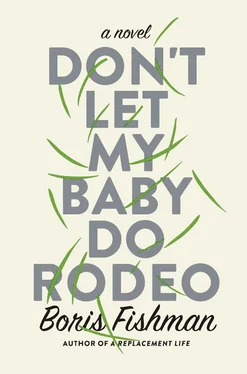“Why do you have that out?” she said cautiously. The folder’s location was not a secret for the adults, but it was buried in the back of a file drawer in Alex’s home office so that Max would never stumble across it. Maya had the berserk thought that Alex wanted to give Max back. No. Even she knew that was insane.
“One page,” he said.
She looked at him quizzically.
“When they give you a human being, they give you one page of medical history.”
“I don’t understand what you’re driving at.”
“One page?” he said. “That’s all you needed to know? Look at this.” He waved the paper. “‘History of heart disease — none.’ No further detail. Did anyone bother to do more than ask? In this country, it’s assumed that the other person is telling the truth unless you can prove otherwise.” A look of — not perplexity, but grief — came over Alex. “Why?” he asked simply.
“You should have gotten involved,” she said coldly. “Save me from mistakes.”
“Give you the paperwork,” he said, “and I wasn’t involved. Take the paperwork away from you, and I’m cutting you back. How should I behave? Explain it to me. Give me a list of instructions.”
“There are privacy laws, Alex. That’s why it’s so thin. But the hospital said everything was fine. And Laurel said so, too. Why was he such an easy infant? He’s been with us for eight years. It can’t have anything to do with his background.”
“Privacy?” Alex said incredulously. “I must respect their privacy after they’ve decided to surrender their child? What about my privacy?”
“Yours was respected in turn. You insisted on a closed adoption and got it.”
“Oh, it was very closed,” he said. “So closed that I had the pleasure of the birth parents in my living room. I’m too soft, Maya — because I didn’t like growing up under my father. But as I become older — I hate to say it, this is the thing that children hate to admit, but I won’t lie to save myself the embarrassment of having been wrong — I see he was right. To know where I live, those people were allowed. For what reason? She needed to see with her own eyes it was far from Montana? Look at a goddamn map. But when I’ve got a question? And for a slightly more significant reason than I want to see where they live, such as my son consorts with wild animals? No — the privacy of the birth parents must be respected. You know what the issue is? We’re too nice, Maya. Too decent. Too fearful. Still the immigrants, thirty-five years later. Still asking permission.”
“Alex,” she said quietly. “First of all, please lower your voice. Secondly, you’re not making sense. You wanted the adoption to be closed.”
“I’m not asking to become their friends. I want a thorough medical history. Down to the Indians, or whoever the hell spawned these people. ‘Don’t let my child do rodeo,’ she said. What does it mean? Don’t let him be like his father? But who is his father? And children are sometimes like their fathers whether they live with them or not. It’s called genes. This is why I was against adoption, Maya. Because you get genes that belong to somebody else. We didn’t ask enough questions. The most important thing in our lives, and our eyes were closed by wishfulness. We wanted too badly for it to work out.”
“You mean my eyes were closed by wishfulness,” she said. “ I wanted it to work out.”
“I am saying ‘we.’ I am trying to be charitable. To hold us both responsible.”
“But that’s only what you are saying .”
“It’s impossible with you.”
“Alex, yesterday, it was you — it was only because you ran out that he got hurt!” She did not want to say it, had promised herself in the night to keep her mouth closed. He was only trying to help.
Alex’s eyes were weary and threatening. “Perhaps you should say thank you that I saved him from worse? Because you were standing at the door like a theatergoer.”
She buried her face in her hands.
He looked at her with spiteful merriment. “This is what you wanted,” he said. “You wanted to have a relationship with the parents. I was against it, yes. But changing circumstances revise facts.” He was not stubborn; he would happily acknowledge a badly made move. Alex leaned gloatingly against the back of his chair. “Tomorrow, I will call the adoption agency and demand their information. And I will threaten to sue if they decline.”
Maya took her fingers from her eyes. “Alex? Let’s go there.”
Alex’s forehead puckered. “Where?”
“To Montana. Just like they came here.”
Alex closed and opened his eyes. “Why would we do that?”
“To meet them. To spend some time with them.”
“I’ll consider us blessed if we can wrest their phone number from the agency,” Alex said. “There’s no reason to go there.”
“Yes, there is. I understand why they came here. It upset us, but I understand it.”
“So, go,” he said, aware of his cruelty, as she did not fly, could not drive far by herself. “You want to go — go.”
“I want Max to see it, too. If he can’t know where he’s from”—she lowered her voice—“at least let him see it.”
“He’s eight — it will mean nothing to him.”
“You left Minsk at eight. It meant nothing to you?”
“Yes, but I knew why I was leaving where I was leaving,” Alex said. “And going where I was going.”
“Shouldn’t our son, too?” she said, again in a decreased tone. This is the way she spoke nowadays: up, down, up, down.
“Please let’s not have this conversation again,” he said.
“What if that’s why he’s acting out?” Maya said. “He senses a lie.”
“Who’s superstitious now?” he said.
“We were told by the adoption people — when they’re confused, sometimes they run away.”
“He thought he was going to find his mother under that river? He was born to a pike? Come on, Maya.”
“Okay, I want to see it,” she said. “Isn’t that good enough? I want to see it. I want to see”—she lowered her voice—“where Max was born. And I can’t take myself. Laurel got to see where we live, I want to see where she lives.”
“Lived,” Alex said. “They’re gone. They took that money and ran. If you don’t know that, you’re a fool.”
“Then that’s what I want to see,” Maya said.
They heard Max descending the stairs and fell silent. He appeared in the doorway to the kitchen. He had gone back to pajamas — he didn’t like sleeping in briefs. “Are you fighting?” he said. He had never asked such a thing.
“Because sometimes, Mama and Papa—” Maya started to say, but Alex was speaking over her.
“Because Mama wants to make you pancakes and I want to make you eggs,” Alex said. “Tell us who wins.”
Max blinked twice, and stared at them.
“Who wins, Maxie?” his father said again.
+
For the second night in a row, Maya did not sleep. In the night, the back of Alex’s hand fell onto her belly. She was about to remove it, but changed her mind; she enjoyed its weight, as dense as a small animal. Her awareness of it made sleep impossible, but sleep was impossible without it, too. She lay in bed and felt the grooves of Alex’s skin with her white belly. His fingers trembled slightly in sleep, the cold gold of the wedding band touching her skin now and then. Other than that, it was his smooth, unworried skin on her own. She resolved that, come morning, she would approach her husband in a new way. Despite different reasons, each had come to desire the same thing: to find Laurel and Tim. They should work together, find their way back to each other, step in tandem. Maya filled with the enthusiasm of a new mission. She required only an objective; that given, she would be set free from the resolutionless murk that ate away at her spirit. In the morning, Alex found her lying as open-eyed as she had six hours before. “Maya,” he shook his head, tenderness in his reproach. “You need to sleep. Need to.” The creases of her eyes watered. With her eyes, she tried to say to him everything that she had felt in the night. Did he understand her? He must have, because he said: “I’m calling — today.”
Читать дальше












